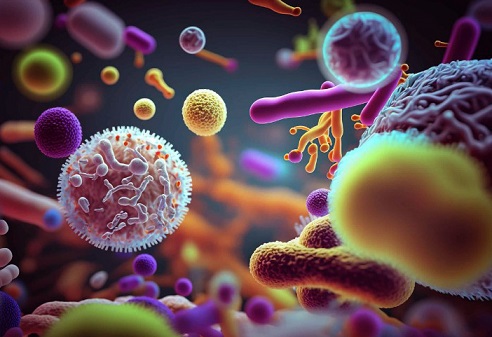Nikhil Prasad Fact checked by:Thailand Medical News Team Nov 01, 2024 1 year, 3 months, 3 weeks, 3 days, 2 hours, 36 minutes ago
Medical News: A recent study from Norway highlights the significant relationship between COVID-19 and gut bacteria in young adults, linking specific bacterial imbalances with prolonged fatigue. The research team comprised scientists from Akershus University Hospital, Oslo Metropolitan University, Norwegian Institute of Public Health, and the University of Oslo, focusing on young adults aged 12 to 25 who experienced mild COVID-19 but were not hospitalized.
 Norwegian Study Links Mild COVID-19 and Gut Bacteria to Fatigue in Young Adults
Norwegian Study Links Mild COVID-19 and Gut Bacteria to Fatigue in Young Adults
This
Medical News report delves into the findings, revealing how certain gut bacteria present after a mild COVID-19 infection may influence fatigue and other persistent symptoms. The study measured the gut bacteria at the initial stage of recovery and again six months later. While COVID-19 was mild in these individuals, many still reported symptoms of fatigue and discomfort six months after the infection.
Key Findings: Gut Bacteria Linked to Fatigue
The researchers found specific types of gut bacteria were more or less abundant in individuals who had COVID-19 compared to those who did not. Two beneficial bacteria, Faecalibacterium prausnitzii and Gemmiger formicilis, were enriched in COVID-19-positive young adults early in their recovery, suggesting these bacteria may help maintain gut health. However, this beneficial effect did not last long; after six months, the abundance of these bacteria decreased.
Interestingly, the study found that individuals with certain bacterial profiles experienced more fatigue. Those with higher levels of Sutterella wadsworthensis and Streptococcus thermophilus showed higher instances of fatigue and persistent symptoms, while lower levels of Faecalibacterium prausnitzii were associated with prolonged fatigue.
The Role of the Microbiome in Long-Term COVID Symptoms
The gut microbiome, the vast ecosystem of bacteria and other microorganisms in the digestive tract, plays a vital role in regulating immune responses and overall health. COVID-19 appears to disrupt this balance, particularly in younger individuals. The beneficial effects of Faecalibacterium prausnitzii and Gemmiger formicilis, both of which support a healthy immune response, were temporary in this study, lasting only in the early stages of recovery.
Moreover, higher levels of Sutterella wadsworthensis were strongly linked to long-term fatigue and other symptoms associated with what is now referred to as post-COVID-19 condition (PCC). This finding is particularly relevant since Sutterella wadsworthensis has been associated with other inflammatory diseases, which might explain its role in PCC.
Understanding Post-COVID-19 Fatigue
One of the more intriguing findings was the link between Clostridium spiroforme and Streptococcus thermophilus with fatigue symptoms at six months. Both bacteria showed increased levels in fatigued individuals, suggesting they could play a role in the persistent fatigue that often follows COVID-19. Clostridium spiroforme is kn
own for its association with inflammation and other health conditions, indicating it may be a target for further research in understanding post-viral fatigue syndromes.
Broader Implications for Gut Health and Viral Recovery
The presence of certain bacteria linked to fatigue also raises the question of whether altering the gut microbiome can influence recovery. The study’s findings support the idea that the gut microbiome may hold clues to better managing or even preventing the long-term effects of COVID-19, especially fatigue.
The researchers emphasized that their findings are exploratory but warrant further study. They hope to understand whether probiotics or specific diets could help re-establish a healthy gut microbiome and potentially reduce the likelihood of prolonged fatigue and PCC.
Conclusions
In conclusion, this study sheds light on the critical role of gut health in recovery from COVID-19, particularly in non-hospitalized young adults who may still face long-term effects. The findings emphasize the need for further exploration into the gut microbiome's potential role in managing and alleviating prolonged fatigue and other post-viral symptoms. As more studies focus on gut health, the possibility of developing dietary interventions or probiotics to support recovery becomes a promising area of investigation.
The study findings were published in the peer-reviewed journal: Pathogens.
https://www.mdpi.com/2076-0817/13/11/953
For the latest COVID-19 News, keep on logging to Thailand
Medical News.
Read Also:
https://www.thailandmedical.news/news/microbiota-dysbiosis-and-serotonin-dysregulation-linked-to-long-covid-gastrointestinal-symptoms
https://www.thailandmedical.news/news/sars-cov-2-induced-gut-dysbiosis-possibly-behind-growing-cases-of-post-covid-insomnia
